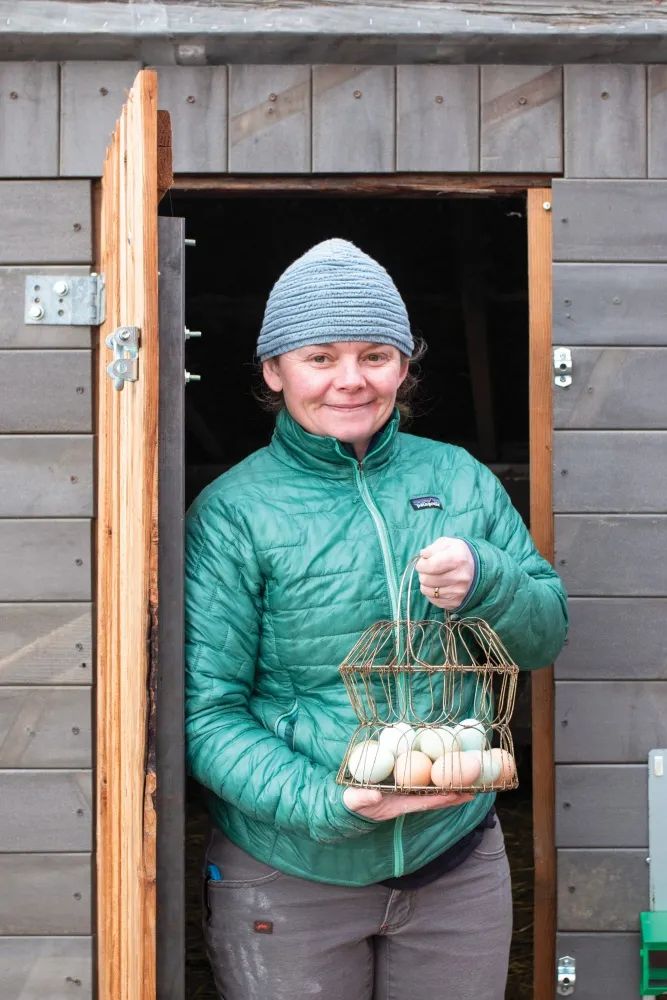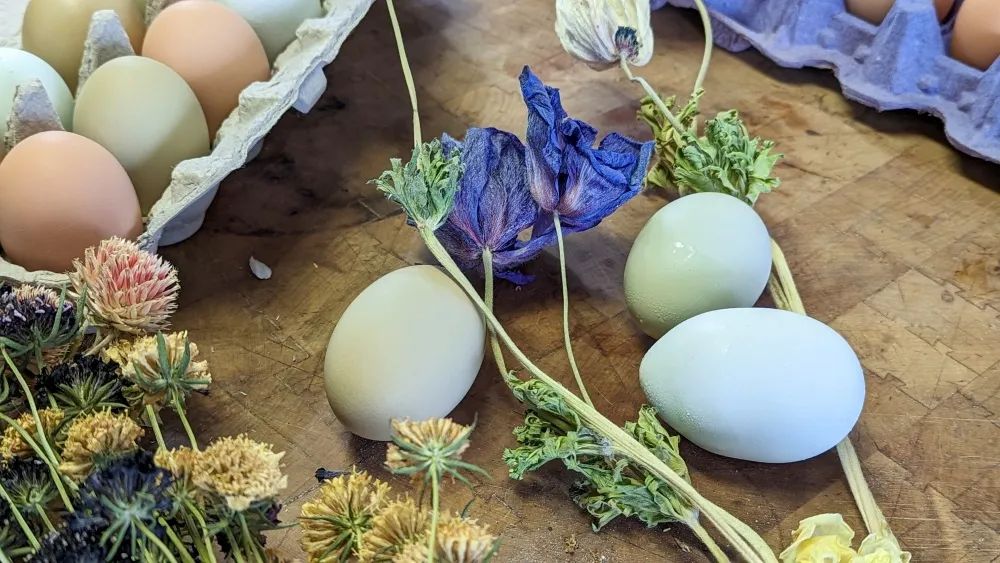
Meet the Farmer: Carah Ronan of Rodi Farm
April 2023
article & photos by renata haidle
You might be in the midst of Easter meal planning as you read this, or maybe you have a more relaxed attitude and leave preparations to the last minute. Regardless, it’s probably safe to assume that eggs are at the top of your shopping list. But do you know where those eggs come from?
It has been a challenging year for the egg industry. We’ve seen avian flu decimating millions of egg-laying birds, severe egg shortages, unprecedented high prices, and the dreaded “only two cartons per customer” in almost every store. If you buy your eggs at the store, that is. But what if there was a better way? A way to purchase fresh eggs of the best quality laid within 20-30 miles of where you live?
If that sounds appealing, meet Carah Ronan. She and her husband, Zach Didier, started Rodi Farm outside Laurel just over two years ago. She aimed to be a good steward of that fertile land and leave it better than when she found it. Then, neighbors knew it as a vegetable farm and cattle ranch that had been in the family for five generations of tough, hardworking Montanans. Yet Carah had a different vision when she returned to Laurel to help out her grandmother, Nita Rowland, who still owns the land.
Using previous experience she gathered while working on Paradise Valley and the Four Corners area flower farms, Carah established Rodi Farm as a wholesale cut flower farm. So, where do the eggs come into this? As we all know, Montana farming comes with severe impediments: hot weather, drought, occasional hail. And grasshoppers. The latter proved to be extremely damaging to flowers. Carah, a firm believer in sustainable agriculture and organic farming, thought of an immediate remedy: birds. She filled the old coop with chickens and populated a pond with ducks. “They eat ten times their body weight in grasshoppers,” she says. The added benefit of harvesting fresh eggs regularly came later, as the egg crisis deepened last year and people started reaching out to her. “Even when we lived in the city down in Texas,” Carah says, “I had chickens in my backyard. Having fresh eggs is just something I've always had; I wouldn't think twice about not having them. Once you try these eggs, it makes it really hard to go back to generic eggs from the supermarket.”

Rodi Farm eggs come in beautiful colors: baby blue, aqua, shades of olive green, cream, and hues of pink
Rodi Farm eggs come in various beautiful colors: baby blue, aqua, shades of olive green, cream, and even hues of pink. The Easter eggers, as the pastel-egg laying hens are called, and the olive eggers aren’t heavy layers, unlike more prolific breeds like Rhode Island Reds. Yet they deliver three to four dozen eggs on average weekly. The surplus Carah and her family can’t use is shared with the community via farmer’s markets, Yellowstone Valley Food Hub, or can be purchased directly at the farm. “ If you're going to go into more of a large scale of selling for big production,” Carah explains, there's a whole process that you have to go through, and you need to get certified to sell your eggs retail.” Cottage laws allow people to sell their eggs at farmers’ markets if they stay under a threshold. “We're not looking at doing high-volume egg sales. We sell the extra that we don't personally use.”
Are these farm-fresh eggs more nutritious? Studies indicate that organic eggs contain more omega-3 fatty acids and higher amounts of vitamins A and E. In addition to their health benefits, organic eggs are also considered to be more ethical than conventional eggs. Carah’s hens are humanely raised, with unlimited access to outdoor space and natural light. But living freely on the range comes with its own set of problems, with natural predators occasionally threatening the chickens’ existence.
“We live between the rivers here and get a lot of animals that come through,” Carah says. “It's a huge migration corridor. There was a bear just down the road last summer. There was a moose that hung out in our little apple orchard. And we have foxes that like to eat the chicken.” Foxes, coyotes, even the occasional eagle have been known to diminish the flock. This leaves Carah with a dilemma: harvest the eggs or encourage the hens to incubate them. “At times, we'll sacrifice selling eggs,” she explains, “just to let them sit and incubate because they'll hatch out chicks. You can also pull the eggs and put them in an incubator inside your house. Then you need to have a broody hen, which is a hen that wants to sit on her clutch of eggs. Not all hens are willing to sit there and incubate their eggs. If you have one that will… she'll protect them against the rest of the flock once they're born. So, it's easier to integrate the baby birds that way because they were already with that broody hen.”
As we approach the end of our interview, Carah steps outside to feed the chickens. They're roaming around the yard, clucking, scratching, and foraging. Carah knows them all by name, and when she picks one up in her arms, the hen poses no resistance, cuddling happily. These chickens help with insect control, provide nutritious food, and fertilize the rows of flowers. Everything happens organically, just like nature intended. And Carah’s goal to prioritize the health of her land, animals, and community seems well underway.
Did you know:
- Cloudy egg whites indicate freshness. The cloudiness is due to the high levels of CO2 present during the laying process.
- The bright orange color of the yolk is a direct result of carotenoids being present in the hens’ diet.
- The bloom is a protective layer surrounding the egg before being laid. Washing destroys the bloom and makes eggs more susceptible to contamination with bacteria. Therefore, washed eggs should be properly refrigerated.
Originally printed in the April 2023 issue of Simply Local Magazine
Never miss an issue, check out SLM's digital editions here!





